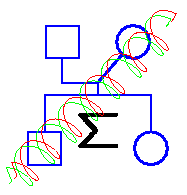
Single nucleotide polymorphisms are discrete Mendelian traits!
This course provides an introduction to the models and methods of Statistical Genetics for students with little Genetics background but with some knowledge of Probability and Statistics. The course provides a basis for further study in Statistical Genetics, whether in Quantitative Genetics, Human and Medical Genetics, Population and Evolutionary Genetics, or Computational Molecular Genetics.
The course material includes:
Simple Mendelian traits; Mendelian segregation, dominant and recessive
traits, X-linked traits, patterns of inheritance. Population genetic
issues; testing Hardy-Weinberg equilibrium, likelihood
estimation of allele frequencies,
the EM algorithm.
Haplotypes, allelic association and haplotyping.
Likelihood estimation of haplotype frequencies.
Mutation, selection, and random genetic drift.
Kinship and gene identity by descent; probabilities on pedigrees. Genetic linkage; meiosis and recombination, two-locus kinship and gene identity, linkage disequilibrium, Two-locus linkage analysis, the probabilities of meiosis patterns. Simple designs for two-locus linkage; testing for linkage, expected lod scores and power to detect linkage, homozygosity mapping.
Meiosis, recombination and map functions. Multipoint linkage analysis; the hidden Markov model for multipoint linkage. The Baum algorithms; the EM algorithm for map estimation. Likelihoods for linkage on large pedigrees: the Elston-Stewart algorithm.
Useful books include:
For your information: here are
It is expected that the Spring 2010 course offering will be very similar. [an error occurred while processing this directive]